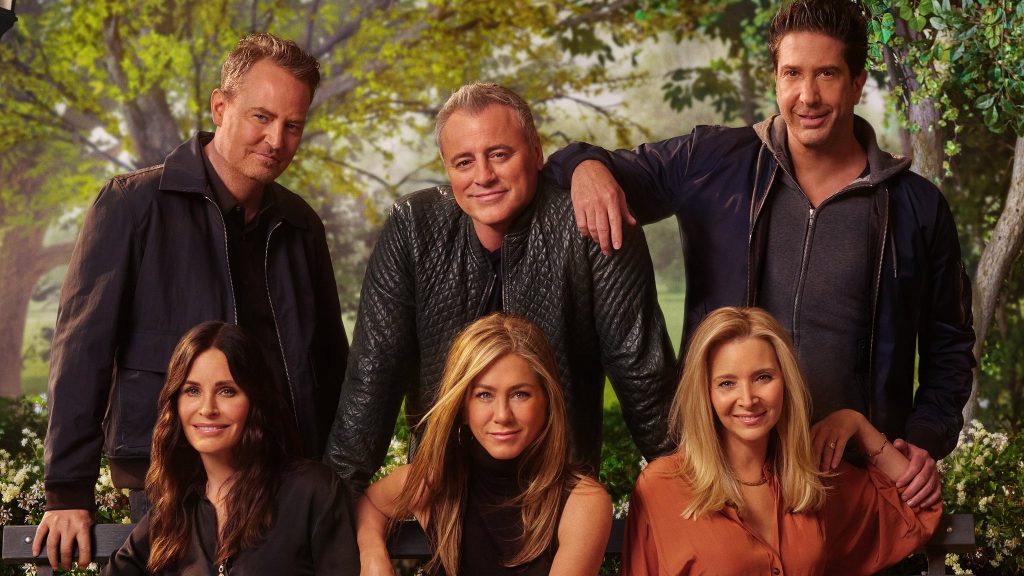Blog Post
The dark, enduring legacy of Friends
By Jonathon Van Maren
If you’ve been anywhere near social media in the past week, you’ll have seen the buzz about a special that aired May 27 on HBO Max—a reunion of the cast of the smash hit 1990s sitcom Friends. Launched in 1994, it rapidly became one of the most popular television shows of all time and was the last sitcom to achieve the number one spot on TV. The series finale in 2004 was viewed by 52.5 million Americans. More than a quarter century later, it is still phenomenally popular. Turn on a TV in a hotel room almost anywhere in the world, and an episode of Friends will probably be on.
The appeal of the show was (and is) simple. Friends showcased that period of life post-puberty but pre-maturity now generally referred to as “adulting.” The characters were young, beautiful, handsome, and hilarious. They all lived with each other or near each other and hung out all the time, making the show seem today like an ancient artifact in an age of social media and digital relationships and dramatically increasing its nostalgic pull. They were perennially falling in love. The casual intimacy of their friendships incurred a longing for the same in the audience; the obvious chemistry and closeness of the cast contributed to this.
As David Crane, Marta Kauffman, and David Bright told NBC in their pitch for the show: “It’s about sex, love, relationships, careers, a time in your life when everything’s possible. And it’s about friendship because when you’re single and in the city, your friends are your family.”
It wasn’t until I was doing the research for my 2016 book The Culture War that I began to come across analyses highlighting a darker aspect of the show’s legacy that I’d never considered. “In reality,” Ashley McGuire of the Institute for Family Studies wrote, “Friends was a decade-long Hollywood experiment in testing the moral limits of Americans and desensitizing viewers to harmful sexual behavior…the show made a punch line out of casual sex and hookups and portrayed them as consequence-free. No STDS, no trips to the abortion clinic, no staring at their phones waiting for the one-night stand to call. Just a good laugh over the last condom in the apartment and a porn marathon.”
TV sitcoms tell stories; stories have storytellers. The cast and crew of Friends wanted to push the envelope, knowing that TV is a frequently a feedback loop that not only reflects culture but also drives, shapes, and informs it. Friends was the second show on TV to depict a same-sex wedding, decades before Obergefell and a year before Ellen DeGeneres famously came out. Ross Geller’s wife leaves him for a woman and marries her—he walks her down the aisle after her bigoted and homophobic father declines to do so. NBC was braced for a backlash when the episode aired, expecting thousands of angry phone calls. They got only two.
Of course, progressive heresy hunters have taken aim at Friends for the homophobia it apparently utilizes in the process of norm-smashing; David Schwimmer (Ross Geller) shrugged off the criticism as ridiculous. “The truth is…that the show was ground-breaking in its time for the way in which it handled so casually sex, protected sex, gay marriage, and relationships,” he said. “The pilot of the show was my character’s wife left him for a woman and there was a gay wedding, of my ex and her wife, that I attended.” Indeed, one writer stated that the show “channeled the warm ‘hang out’ vibe through 10 seasons that revolved around six friends and their everyday lives”—and “introduced me to lesbianism, surrogacy, and foosball.”
As McGuire put it: “Friends was the entire sexual revolution tied up in one made-for-TV package and wrapped in ‘warm hang out vibes.’” Most people were too busy laughing to notice; as with many sitcoms, people who morally opposed much of the behavior unfolding onscreen found themselves rooting for illicit hookups, divorces, and laughing at predatory sexual behavior (Joey Tribbiani: “She’s needy, she’s vulnerable—I’m thinking—cha-ching!”) And when religious people consumed the same entertainment as everybody else, it created a sort of moral schizophrenia—laughing along about everything from porn binges to promiscuity one day while attending church to hear a pastor explain how such things were so wicked God Himself had to be crucified to save people from these sins the next. Most mainstream TV shows offered people the opportunity to entertain themselves by laughing at sin, although few realized it or saw it that way.
Plenty of progressives certainly see the show that way. Samantha Allen of Mic.com wrote that the “enduring cultural legacy” of Friends was that “it set the standard for how sitcoms could and would talk about sex. But for a ’90s sitcom on a major American television network, Friends exhibited a remarkable openness about sex that set the pattern for sitcoms on air today. There would be no New Girl, no Mindy Project, no Sex and the City without Friends. At the exact same moment when the United States was whipping itself into a moral panic over Monica Lewinsky, Monica Geller and her friends were breaking television taboos and giving viewers a decade-long crash course in sex education.”
Friends, more than any other previous sitcom, extracted sex from the marriage and demystified it. As Jasmine Lee wrote for Screen Prism: “Friends showcases sex as just a natural act in which two consenting adults participate. Sex doesn’t change the world, doesn’t lock two people into a ‘til-death-do-us-part commitment, and doesn’t require much more than ‘Yeah, s/he’s cute, I’m interested in his/her sexy bits, let’s get it on.’ Considering this was a primetime television show, this is a fabulous piece of normalizing presentation.” For those wondering, “normalization” means “the process through which ideas and behaviors that may fall outside of social norms come to be regarded as ‘normal.’”
Friends also did much to normalize watching pornography as part of the everyday lives of young adults. This was before digital pornography became a ubiquitous part of American life (the first iPhone came out in 2007, three years after the show went off-air.) There was an episode featuring Chandler and Joey stumbling across a free porn channel and watching porn for days; Phoebe’s sister was a porn star; porn is a punchline, not sexual poison. For young people taking their cues from their favorite TV show, the message was simple: Normal people watch pornography. It’s no big deal. Women don’t care about it. It’s just part of being an adult. Feel free to watch porn, just like your Friends.
Friends won an award from the LGBT activist organization GLAAD back in 1995, and despite recent controversies over how the show portrays LGBT people, it was cutting-edge and paradigm-shifting. Chandler Bing’s father, for example, is portrayed as transgender. Activists now condemn the portrayal as transphobic, which misses the point. By getting Americans to laugh at Mr. Bing, the male-to-female transgender person, they reduced the shock such things would once incur. You cannot be morally outraged by something you find funny; Chandler eventually comes around and accepts his father’s identity. A decade or so later, the American elites got on board with transgenderism, too. Friends, again, was just a bit ahead of its time. Only because the LGBT agenda is now the new orthodoxy are the show’s jokes considered blasphemous.
For a decade, Friends projected the Sexual Revolution and a “liberated” way of life into the culture, while millions of viewers projected themselves back into the show. The HBO Max special featured Nobel Prize winner Malala Yousafzai speculating with her best friend that she might be a “Joey”; millions have identified with the characters, the stories, and the show itself. The show has become a ubiquitous cultural artifact; the characters have become icons. But when we look at America a quarter century after the Friends finale, if we honestly assess the impact of the Sexual Revolution, and if we consider the extent to which this show and its comedic genius served as propaganda for the Big Lie—it is impossible not to conclude that the legacy of Friends is tragically unfunny, indeed.









It is interesting to note that even as a 62 year old woman who has not seen a Friends episode, I am still aware of its impact. It is pervasive! Thank you for the analysis. It is very well done.
You should do yourself a favor and dive into who creates and produces these shows. You will find a disturbing “family” trend. I can’t explain it, but it’s very disheartening.
This
As I watched my kids, their youth group, ones I had help raise, shielded, prayed over buy into and drink this poison my heart ached…& still does (ie:Game of Thrones, etc.). They are soothed by binge watching Friends…& with other shows decide “it isn’t that bad”. Now sharing with my grandchildren.
They are believers, deceived by the evil one.
I have never seen an episode of this program, but I have the seen the cultural and moral shift as a result of its influence. I still do not watch TV. It is obnoxious, and I often wonder about the bonding of hearts and minds to their “I” phones and the binge watching of “Friends,” when those same friends could binge watch porn. Truly disheartening. Believers, you need to wake up your minds!
Interesting article. I’m not convinced “Friends” created/framed the agenda as much as reflected the already existing worldview of most North Americans, including as you note, too many professing Christians. Certainly they were “promoting” a worldview, though I think it was highly related because North Americans already viewed sexuality and relationships from this perspective in the 90s, and they simply allowed people to talk about it openly at the proverbial water cooler the next day.
Some acquaintances asked if I wanted to watch “Friends” with them in 2012. I’d watched a few episodes on my own in 2004 and bluntly declined with the phrase “Too much vagina.”
Did you miss the 70s? Because that’s when all of this foolishness got started. Friends was, if anything, late to the party and reflecting something that already existed. It was in many ways a stupid show with some astonishingly dumb and unbelievable characters, but everything that happened on that show was already going on. The amazing thing is, no one partook of the greatest postmodern sacrament and had an abortion.
I read this article about “Friends” and started to think <>
“The Love Boat” seems disgusting and only AIDS put a temporary break on displaying promiscuity on TV!
I have never watched even one episode of “Friends” but I certainly recall it’s debut and the media gushing over it. I heard enough from them to know I’d never want to see it.